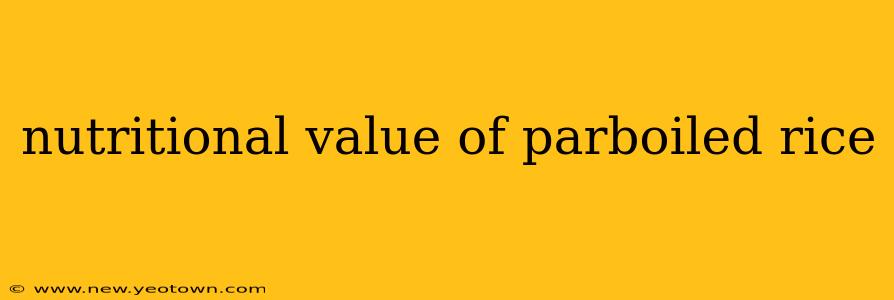Rice, a staple food for billions worldwide, comes in many forms. But parboiled rice, often overlooked, boasts a nutritional profile that surpasses its white rice counterpart. Let's embark on a journey to uncover the secrets of this often-underestimated grain and explore why it deserves a place in your diet.
Our story begins in the paddy fields, where rice is harvested. Unlike regular white rice, which is milled immediately after harvesting, parboiled rice undergoes a unique process. This process involves soaking, steaming, and then drying the rice grains before milling. This seemingly simple treatment significantly alters the nutritional composition, transforming it into a nutritional powerhouse.
What Makes Parboiled Rice Nutritionally Superior?
The parboiling process traps vital nutrients within the rice grain. This is why parboiled rice retains significantly more nutrients compared to white rice, which loses much of its nutritional value during milling. This difference is truly remarkable, offering a wealth of health benefits.
Higher Nutrient Retention:
The key lies in the parboiling process itself. By steaming the rice before milling, many of the essential nutrients that would typically be lost during the milling process are retained within the grain's core.
Increased Fiber Content:
Parboiled rice boasts a higher fiber content than white rice. This fiber is crucial for maintaining a healthy digestive system, promoting regularity, and aiding in weight management. The increased fiber also contributes to a feeling of fullness, helping you feel satisfied for longer.
Improved Vitamin and Mineral Profile:
Parboiled rice holds onto a greater concentration of essential vitamins and minerals, including:
- Vitamin B: Parboiled rice is a decent source of several B vitamins, crucial for energy production and nerve function.
- Iron: A significant portion of the iron present in the rice kernel is preserved through the parboiling process. Iron is essential for healthy red blood cells.
- Magnesium: Important for muscle function, nerve transmission, and blood sugar control.
- Manganese: A crucial mineral involved in bone health, wound healing, and metabolism.
Frequently Asked Questions (PAA) about Parboiled Rice
Let's address some common questions surrounding the nutritional value of parboiled rice:
Is parboiled rice healthier than white rice?
Absolutely! Parboiled rice is undeniably healthier than white rice due to its significantly higher nutrient retention. The parboiling process locks in essential vitamins, minerals, and fiber, making it a more nutritious choice.
Does parboiled rice have more protein than white rice?
While the protein content difference isn't dramatically high, parboiled rice generally contains slightly more protein than white rice. This subtle difference adds to its overall nutritional value.
Is parboiled rice good for weight loss?
The higher fiber content in parboiled rice contributes to increased satiety, helping you feel fuller for longer and potentially aiding in weight management. However, portion control remains crucial for effective weight loss.
What are the benefits of eating parboiled rice?
The benefits are plentiful! From improved digestion and enhanced energy levels to a boosted immune system and better blood sugar control, parboiled rice contributes to overall well-being. It's a versatile and nutritious addition to any healthy diet.
How does the glycemic index of parboiled rice compare to white rice?
Parboiled rice generally has a lower glycemic index than white rice. This means it causes a slower and more gradual rise in blood sugar levels, making it a better choice for individuals managing diabetes or blood sugar levels.
Conclusion: A Nutritious Choice for a Healthier You
Parboiled rice, with its superior nutritional profile compared to white rice, is a smart and delicious choice for a healthy and balanced diet. Its enhanced nutrient retention, increased fiber content, and improved vitamin and mineral profile make it a valuable addition to your meals. So, next time you’re planning your grocery shopping, consider giving this nutritional powerhouse a try! You might be surprised at how much you enjoy it, both in taste and in the positive impact it has on your health.

